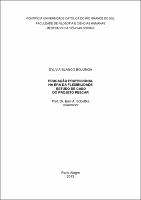| Share record |


|
Please use this identifier to cite or link to this item:
https://tede2.pucrs.br/tede2/handle/tede/4716| Document type: | Dissertação |
| Title: | Educação profissional na era da flexibilidade : estudo de caso do Projeto Pescar |
| Author: | Meneghetti, Sylvia Bojunga |
| Advisor: | Sobottka, Emil Albert |
| Abstract (native): | Os processos de trabalho, os padrões de emprego e a formação dos trabalhadores transformaram-se radicalmente em escala global. Nesse cenário de mudanças, o presente estudo de caso analisa o modelo de educação profissional em ambiente corporativo implantado no Brasil pelo Projeto Pescar. Desenvolvido por empresas, instituições públicas e da sociedade civil, sob coordenação de uma entidade privada sem fins lucrativos, o Projeto Pescar opera em sistema de rede e destina-se a jovens considerados em situação de vulnerabilidade social. A partir das noções de flexibilidade e de resiliência, tanto dos indivíduos quanto das organizações, examinam-se questões relativas ao mundo do trabalho e aos processos de modernização, referenciadas em Sennett (2006; 2010); Antunes (2005; 2010); Offe (1989); Braverman (1987); Harvey (1998); Giddens, Beck e Lasch (1997) e Baumann (2001), entre outros autores. A análise das relações indivíduo/sociedade, cultura/identidade, dos jogos de poder e dos contextos de ação apoia-se em Bourdieu (2010); Elias (1994); Friedberg (1995) e Cuche (2002). Após investigar antecedentes históricos, marcos de inflexão, formas de operação e de relacionamento dos atores sociais do Projeto Pescar desde sua criação, em 1976, até 2012, discutem-se os conceitos de juventude/juventudes e a condição de vulnerabilidade social dos jovens, relacionando-os às entrevistas conduzidas como narrativas biográficas.Conclui-se que programas de educação profissional desenvolvidos no meio corporativo favorecem a formação dos jovens para a vida e facilitam seu ingresso no mercado de trabalho. Essas ações, porém, são paliativas. Dada a dimensão do desafio brasileiro, para operar mudanças essenciais na base da educação profissional, é necessária a convergência de ações de governos, empresas e sociedade civil em um mesmo sistema. Embora já existam os mecanismos legais para tanto, sugere-se criar conexões mais efetivas entre escolas públicas, universidades, empresas, instituições do Sistema S e centros tecnológicos para tornar a formação técnica de nível médio mais atraente e mais adequada às juventudes do século XXI. |
| Abstract (english): | Once labor processes, work patterns and workers educational skills have changed radically in a global scale, the present case study analyses the professional education model used for the corporate milieu and applied in Brazil by the Projeto Pescar. Developed by private companies, public institutions and civil society entities under the coordination of a private non-profit organization, the Projeto Pescar professional educational model operates through a network system aiming to include socially vulnerable youngsters. As a starting point, the notions of flexibility and resilience are taken referring both to individuals and organizations. The problems concerning the labor world and the modernization processes are referenced on the works of Sennett (2006; 2010); Offe (1989); Antunes (2005; 2010); Braverman (1987); Harvey (1998); Giddens, Beck and Lasch (1997) and Baumann (2001), among other authors. The analysis of the relations between individual/society, culture/identity, the power games and the action contexts is based on Bourdieu (2010); Elias (1994); Friedberg (1995) and Cuche (2002). After investigating Projeto Pescar s historical background, turning points, operational forms and relationship with the social actors from its creation in 1976 up to 2012, the concepts of youth/youths and the social vulnerability aspects of the youngsters are discussed and related to interviews conducted as biographical narratives.In conclusion, it is stated that the professional education projects undertaken by private institutions favor the youngsters preparation for life and do facilitate their access to the corporate environment. These actions, however, are merely palliatives. Considering the dimension of the Brazilian challenge, in order to operate essential changes in the basis of the professional education it is necessary that governmental, private and civil society actions converge into a system. Even though the legal framework for this system already exists, this study suggests the need to create more effective connections amongst public schools, universities, companies, the S System institutions and technological centers to turn the technical education in the secondary level more attractive and more adequate to the youths of the XXI century |
| Keywords: | EDUCAÇÃO PROFISSIONAL ENSINO PROFISSIONALIZANTE ADOLESCENTES E SOCIEDADE - RIO GRANDE DO SUL TRABALHO - ASPECTOS SOCIAIS |
| CNPQ Knowledge Areas: | CNPQ::CIENCIAS SOCIAIS APLICADAS |
| Language: | por |
| Country: | BR |
| Publisher: | Pontifícia Universidade Católica do Rio Grande do Sul |
| Institution Acronym: | PUCRS |
| Department: | Faculdade de Filosofia e Ciências Humanas |
| Program: | Programa de Pós-Graduação em Ciências Sociais |
| Access type: | Acesso Aberto |
| URI: | http://tede2.pucrs.br/tede2/handle/tede/4716 |
| Issue Date: | 27-Mar-2013 |
| Appears in Collections: | Programa de Pós-Graduação em Ciências Sociais |
Files in This Item:
| File | Description | Size | Format | |
|---|---|---|---|---|
| 448246.pdf | Texto Completo | 1.43 MB | Adobe PDF |  Download/Open Preview |
Items in DSpace are protected by copyright, with all rights reserved, unless otherwise indicated.




